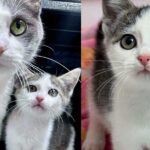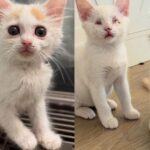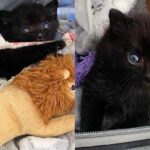As a cat owner, providing the best care for your furry friend is a top priority. This includes not only ensuring they have proper nutrition and exercise but also keeping them safe from harm. One of the ways you can protect your cat is by being aware of what cat foods are dangerous for them to consume.
There are several common foods that may seem harmless but can be potentially deadly for cats. Ingesting these items can lead to serious health complications, including organ damage and even death. Therefore, it’s important to educate yourself on these dangerous foods and take necessary precautions to keep them out of reach from your feline companion.
In this article, we will explore some of the most hazardous cat foods that your feline friends should never eat so that you can keep your pet healthy and happy.
Chocolate
If your feline friend ever gets their paws on chocolate, it could lead to a dangerous and potentially deadly situation. As much as we humans love indulging in this sweet treat, it’s extremely toxic for cats due to the presence of theobromine.
This chemical compound can cause severe vomiting, diarrhea, hyperactivity, tremors, and even seizures in cats. Therefore, it’s essential to keep any form of chocolate away from your cat at all times.
While chocolate may have health benefits for humans such as improving heart health and cognitive function, there are no such advantages for cats. In fact, feeding them even a small amount can be detrimental to their health. If you’re looking for ways to treat your furry pal without compromising their well-being, consider recipes that use cat-friendly ingredients like tuna or chicken instead.
It’s worth noting that while chocolate is harmful to cats, some other pets like dogs are more susceptible to its toxicity due to their size and metabolism. A comparative analysis reveals that a small amount of chocolate that might only cause mild discomfort in a human could prove fatal for smaller animals like rabbits or hamsters.
So always make sure you keep chocolates locked away from all your furry friends! Now let’s move on to another food item that should be avoided – onions and garlic.
Onions and Garlic
Onions and garlic shouldn’t be given to your feline friend as they can cause severe damage to their red blood cells. It’s important to note that all forms of onions, including powdered, raw, cooked, and dehydrated varieties, can pose a risk to cats. Garlic is also harmful in large amounts.
Here are some reasons why you should avoid giving onions and garlic to your cat: – Onions and garlic contain compounds that can damage your cat’s red blood cells, leading to anemia. – Symptoms of onion or garlic toxicity in cats include weakness, lethargy, pale gums or tongue, vomiting, diarrhea, and difficulty breathing. – Even small amounts of onion or garlic can be dangerous for cats.
While there are health benefits of onions and garlic for humans when consumed in moderation as part of a balanced diet, these foods should never be given to cats. Fortunately, there are alternative cat-safe seasonings that you can use when cooking for yourself and your pet. Some safe options include parsley, oregano, basil, turmeric powder, or freshly grated ginger root.
When feeding your cat homemade meals or treats, make sure you double-check the ingredients list before serving. It’s crucial to keep your feline friend away from any food items that could harm their health.
Now that we have covered the risks associated with onions and garlic, let’s move on to the next subtopic: dairy products.
Dairy Products
You may not realize it, but giving your furry friend dairy products can cause them discomfort and digestive issues. Most cats are lactose intolerant, which means they lack the enzyme necessary to digest lactose properly. Feeding your cat milk or other dairy products can lead to an upset stomach, diarrhea, and even vomiting.
If you’re worried about your cat not getting enough calcium in their diet without dairy products, don’t fret. There are plenty of alternative sources of calcium for cats that won’t upset their stomachs. For example, canned fish like salmon and sardines contain high levels of calcium and are a great source of protein for your feline friend.
Some people swear by feeding their cats yogurt or kefir as a way to provide them with probiotics and healthy gut bacteria. While these options may be tempting, it’s important to note that they still contain lactose. The pros and cons of feeding your cat yogurt or kefir should be carefully considered before making a decision.
When it comes to keeping your cat safe and healthy, avoiding certain foods is crucial. Now that you know the dangers of feeding your cat dairy products, let’s move on to another food item you should never give them: grapes and raisins.
Grapes and Raisins
Steer clear of grapes and raisins, as they can be like hidden landmines for your feline friend’s health. These seemingly harmless fruits are potentially toxic to cats, causing kidney failure in some cases. It’s best not to take any chances when it comes to what your cat consumes.
If you suspect that your cat has eaten grapes or raisins, look out for symptoms such as vomiting, diarrhea, lethargy, and a decrease in appetite. These signs could indicate that your cat is suffering from grape or raisin toxicity. Seek veterinary attention immediately if you notice any of these symptoms.
Thankfully, there are plenty of alternatives to grapes and raisins in your cat’s diet. You can opt for healthier treats such as small pieces of cooked meat or fish, hard-boiled eggs, or even fresh fruits such as blueberries or watermelon (without the seeds). Remember to always be cautious about what your fur baby eats and keep them away from harmful foods like grapes and raisins.
When it comes to caffeine consumption by cats, it’s important to know the dos and don’ts. Keep reading to learn more about how this stimulant can affect your feline friend’s health.
Caffeine
If you’re a coffee lover, be careful not to share your morning brew with your feline companion, as caffeine can have serious negative effects on their health. Cats are very sensitive to the stimulant properties of caffeine, which can cause restlessness, rapid breathing, heart palpitations, muscle tremors and even seizures. Ingesting large amounts of caffeine can be fatal for cats.
It’s important to keep all caffeinated products out of reach and never give them to your cat intentionally. The effects of caffeine on cats vary depending on the amount ingested and the size of the cat. Even small amounts of caffeine found in tea or chocolate can cause adverse reactions in cats. Symptoms may appear within 30 minutes after ingestion and last up to 12 hours or more.
If you suspect that your cat has ingested anything containing caffeine, seek veterinary care immediately. Fortunately, there are safe alternatives to caffeinated products for cats that still provide stimulation without causing harm. You can offer your cat toys that encourage playtime and activity or invest in a scratching post or climbing tree for them to climb and explore. Additionally, there are many natural supplements available at pet stores designed specifically for feline energy support that don’t contain any harmful ingredients like caffeine.
It’s important to keep all caffeinated products out of reach from your furry friend as they can have serious negative effects on their health. Instead, opt for safe alternatives like toys or natural supplements that will promote their energy levels without putting them in danger. Up next, we’ll discuss another food item that should never be shared with felines: alcohol.
Alcohol
Beware of the dangers of alcohol for your feline friend, as even small amounts can lead to symptoms such as vomiting, disorientation, and difficulty breathing. Unlike humans, cats can’t metabolize alcohol properly due to their smaller size and liver capacity. Even a small amount of alcohol can cause damage to your cat’s liver and nervous system.
The effects of alcohol on cats’ liver and nervous system can be severe, leading to long-term damage or even death in some cases. Symptoms may not appear immediately after ingestion but can show up within hours or days. If you suspect that your cat has consumed any amount of alcohol, seek veterinary care immediately.
As a responsible cat owner, it’s important to keep your feline friend away from any type of alcoholic beverage. Instead, consider alternatives like pet-friendly beverages or treats that are specifically designed for cats. There are many ways to celebrate special occasions with your furry companion without putting their health at risk.
Raw meat and fish can also pose a significant danger to cats if consumed improperly. It’s important to know which foods are safe for your feline friend and which ones should be avoided at all costs.
Raw Meat and Fish
Now that we’ve covered the dangers of alcohol for cats, let’s move onto another risky food: raw meat and fish.
While it may seem like a natural choice for carnivorous felines, feeding your cat raw meat can actually pose serious potential health risks. Raw meat and fish can contain harmful bacteria such as salmonella and E. coli, which can lead to vomiting, diarrhea, dehydration, and even death in severe cases.
Additionally, consuming raw fish can cause thiamine deficiency in cats which can result in neurological problems.
If you want to provide your cat with protein sources besides commercial cat food or cooked meat, there are safer alternatives available. Consider feeding your cat cooked eggs or lean meats like chicken or turkey. You could also try adding small amounts of vegetables like spinach or carrots to their diet for added nutrients.
Always consult with a veterinarian before making any significant changes to your cat’s diet.
Conclusion
Congratulations! You’re now fully aware of the most dangerous foods your feline friend should never eat. As a responsible pet owner, it’s crucial to keep these items out of reach and avoid feeding them to your cat at all costs.
Remember that chocolate can be deadly for cats due to its toxic substance called theobromine. Onions and garlic can cause anemia in cats, while dairy products can lead to digestive problems.
Grapes and raisins may cause kidney failure in cats, caffeine may result in heart palpitations, alcohol can be downright fatal, and raw meat and fish may contain harmful bacteria.
As you continue to care for your furry companion, always prioritize their safety by ensuring they only consume food that is healthy and safe for them. Keep a watchful eye on their diet, especially when introducing new food items.
By doing so, you’re not just keeping them away from danger but also giving them a happy and healthy life full of love and attention.
Read more:






























